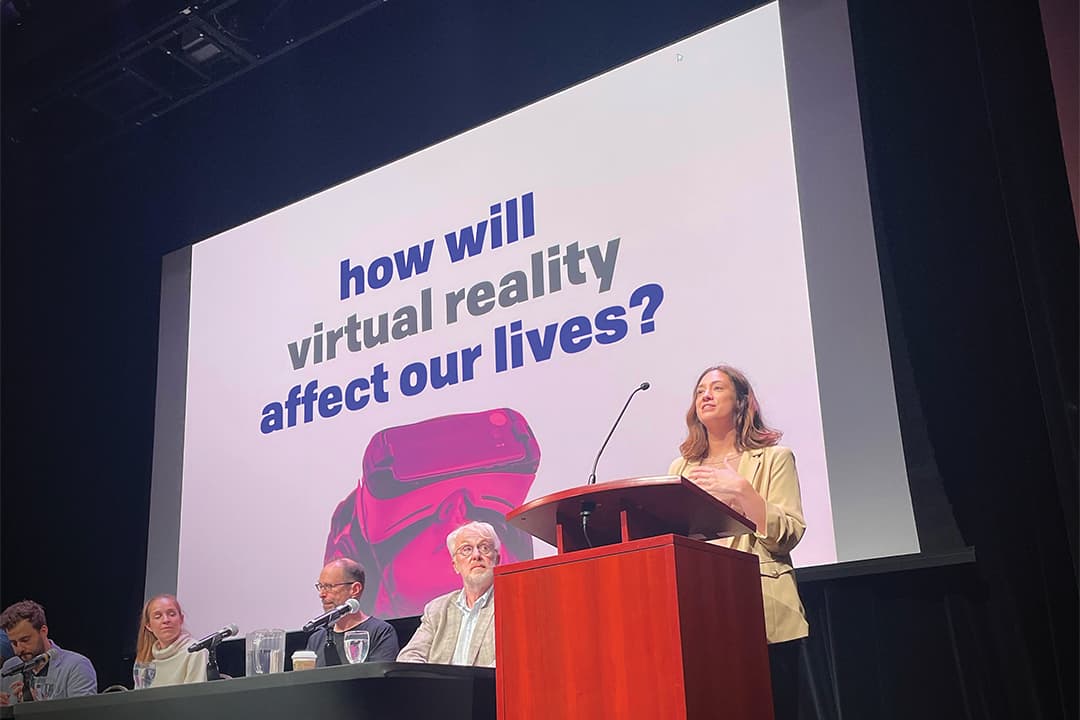It takes great vision and knowledge to tackle questions as vast as those associated with the future of virtual reality (VR), but on September 19, scholars from a range of U of T’s departments and disciplines gathered to do just that at the September Soiree in Technophilosophy.
Professor Karina Vold from the Department of Philosophy — who specializes in the philosophy of artificial intelligence and applied ethics — organized the event, which was sponsored by the Schwartz Reisman Institute for Technology and Society and the Institute for the History and Philosophy of Science and Technology. The event brought a diverse party of speakers together at the Isabel Bader Theatre to discuss what VR will change in our lives going forward.
Predigital origins of VR
A major theme that appeared throughout the discussion is how the roots of what we now know as VR harken back to a predigital age. Avery Slater, an assistant professor in the Department of English specializing in twentieth and twenty-first-century literature, noted how the conceptual roots of VR lie in literature, with books like Neal Stephenson’s sci-fi novel Snow Crash furnishing both the vocabulary and ideas behind it.
In an interview with The Varsity, Adrien Zakar, who works in the Department of Near and Middle Eastern Studies with a focus on cartography and geography, noted that “there’s something very interesting in new technologies being both cast as groundbreaking, but at the same time raising issues that we already know, and that we’re very familiar with.” During the event, Zakar pointed to cartography as another predigital precursor to VR, as the field offers a 2D representation of a 3D space that we treat much like the world around us when we apply our imagination.
Zakar told The Varsity that maps are also an example of technology subtly entering our lives, creeping in under our very noses, much like how VR has and may continue to in the coming years. “I think what’s valuable in bringing maps into the picture is to observe the fact that we use them every day without really realizing that we do and without necessarily being even curious about how it became so,” Zakar said.
Creating immersion in VR
Another major theme that dominated the discussion was the role of human imagination in creating immersive encounters with VR. During the discussion, Professor Karan Singh, whose research involves the development and study of virtual and augmented reality, argued that VR is currently not immersive enough to be too different from television. With his research, however, Singh has come across robotic arm implementations in conjunction with VR that were “highly engaging,” allowing people to easily believe that virtual objects are real.
Professor Brain Cantwell Smith, who is the Department of Philosophy’s Reid Hoffman chair in artificial intelligence, responded that even if VR is limited to sight and sound, we are still interacting with the people and ideas behind the virtual representation and can be immersed in them, much like how we interact with a writer and not the ink when reading a letter.
When it comes to sensory perception, David Rokeby, an assistant professor with the Centre for Drama, Theatre & Performance Studies and associate director at BMO Lab, illustrated that we might have to dampen parts of our senses to be fully immersed, turning off certain thoughts.
Professor Jessica Hall, whose work focuses on the philosophy of computing, pointed out another issue with the immersion of VR: there seem to be certain things whose constitutive features escape virtual representation. This is apparent when exploring meaningful experiences and relationships in VR, as well as contemplating questions about whether achievements and experiences in a virtual world have the same meaning as they do in the real world.
Toward the end of the event, the panel took questions from the audience. One person asked whether VR would eventually reach a point where we could see the world in ways we were previously unable to, such as understanding experiences of non-human animals.
This brings philosophical theories like those of Thomas Nagel — and his work on what consciousness consists of — into the spotlight. Nagel puts forth that we can know everything about a creature, such as, for example, a bat, and know specific things about how they experience the world, such as that they use sonar for vision. However, we won’t be able to understand the phenomenological experience of actually being the bat. VR has the potential to change that by giving us experiences that humans previously would not have had access to.
With VR as it stands, it appears as though the technology isn’t as immersive or impactful as people may expect it to be. As many of the panelists pointed out though, VR does hold a lot of potential, but this comes with potential issues that we will have to look out for. However, if certain things are simply not possible to represent in a virtual world, it may be impossible to ever fully immerse ourselves in VR.


